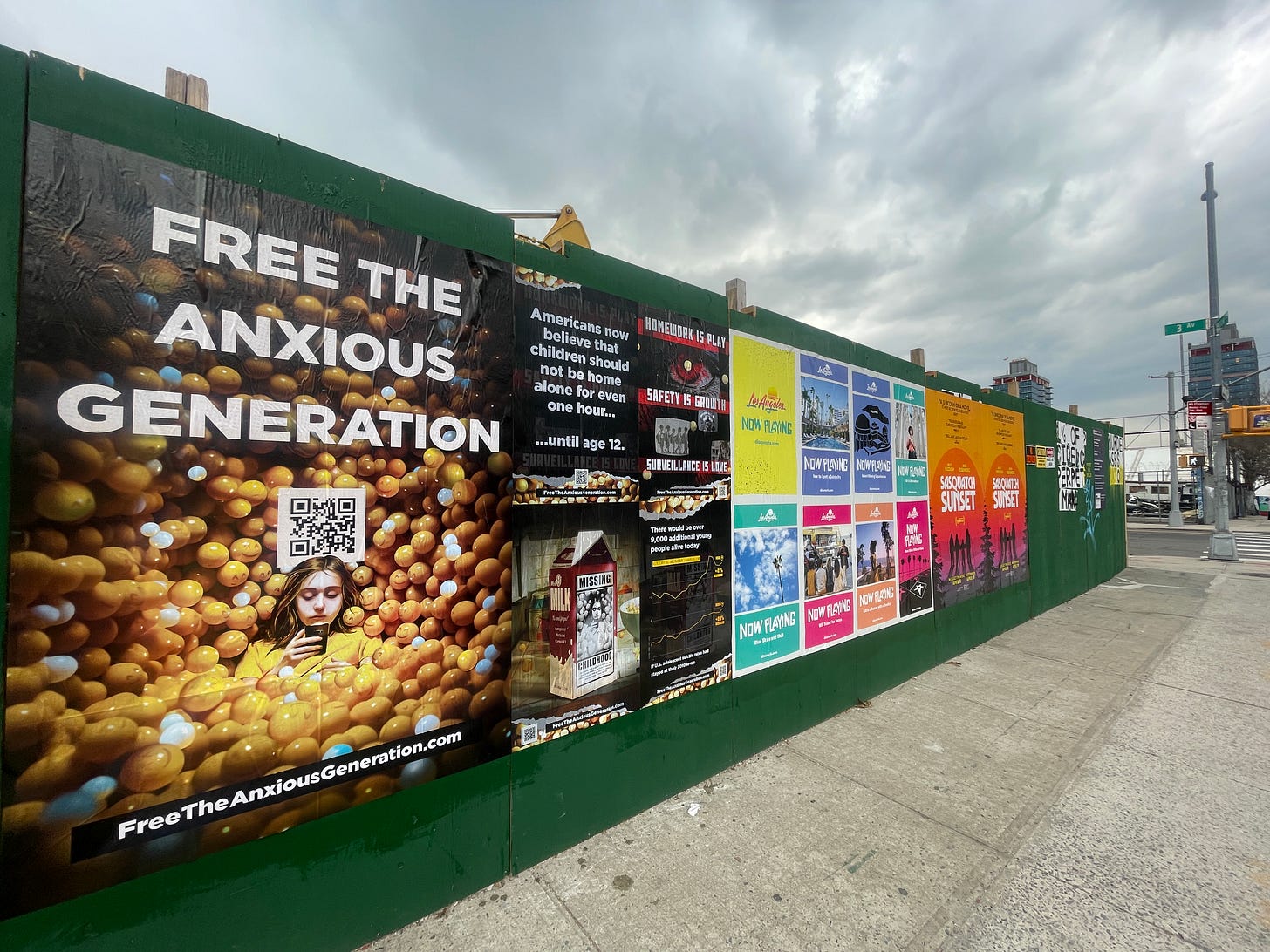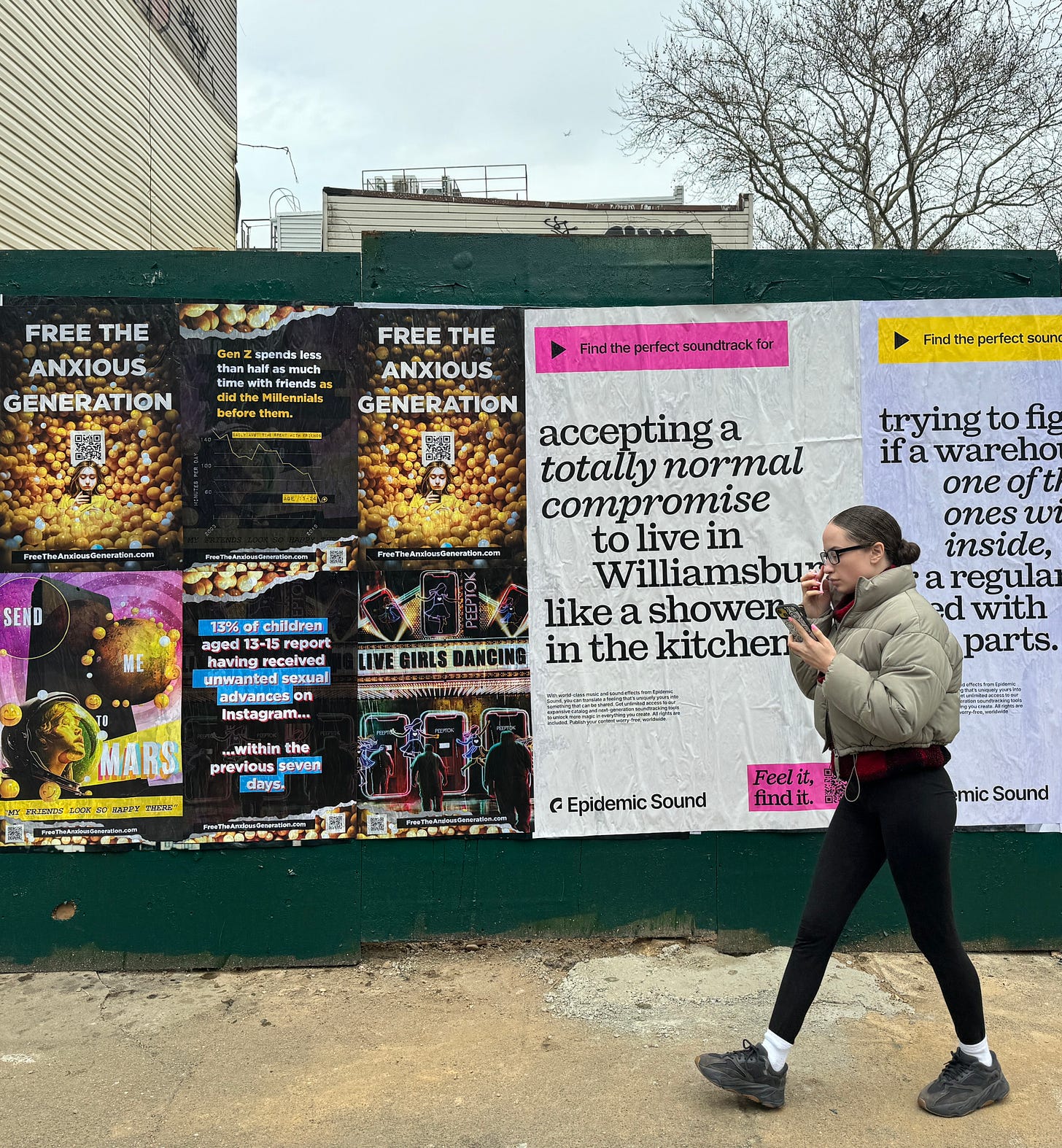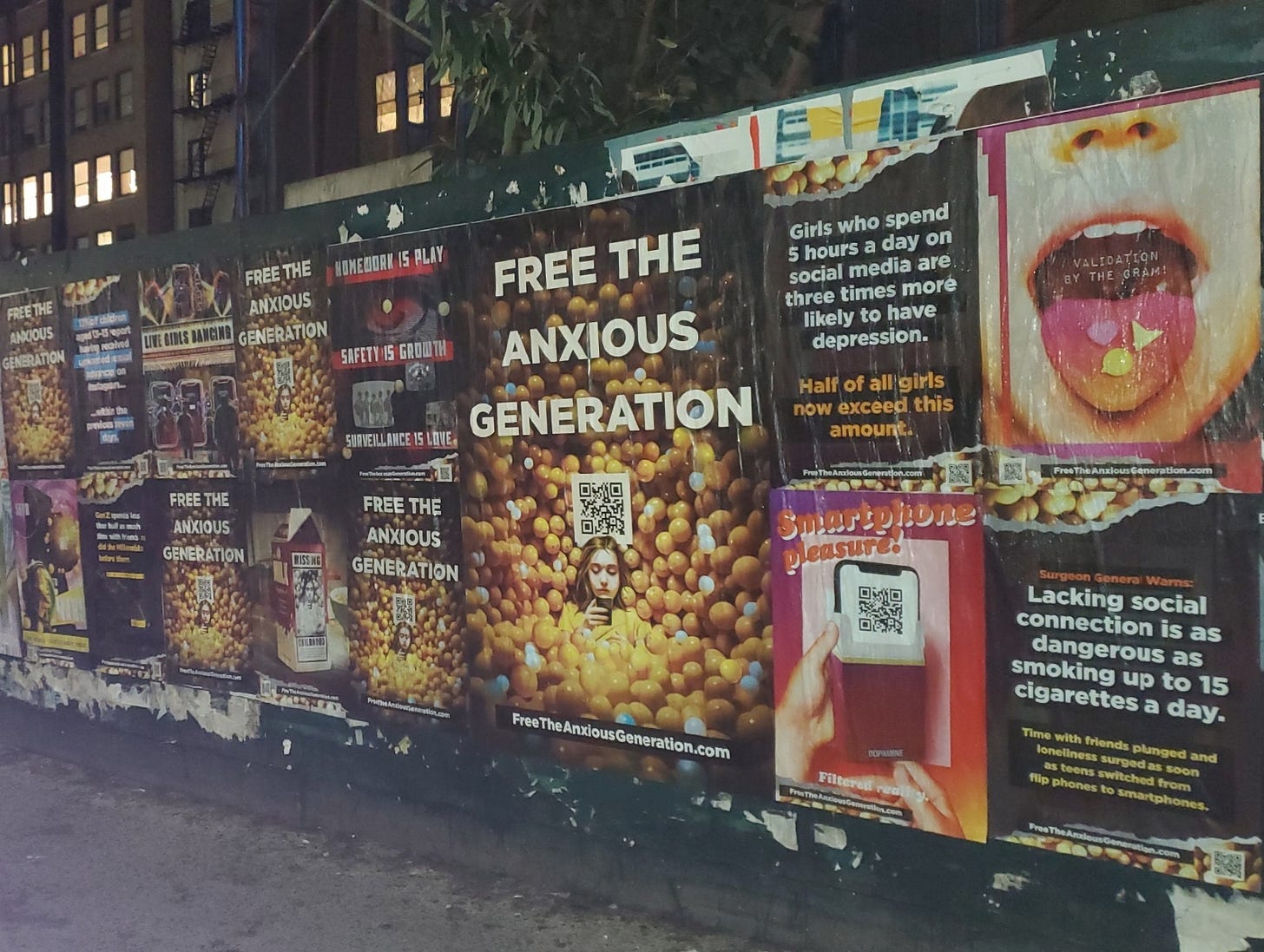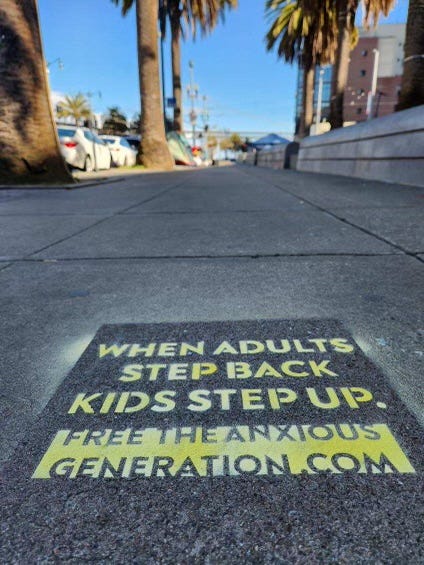It’s Time To Free The Anxious Generation
The book comes out today. By the end of 2025, we will roll back the phone-based childhood.
It’s finally here! Our book The Anxious Generation is published in the USA and UK today, March 26.
Today is also the launch day of a movement in the U.S., the UK, and other nations to Free the Anxious Generation by rolling back the phone-based childhood, restoring the play-based childhood, and reclaiming life in the real world.
If you are concerned about child and adolescent mental health, the well-being of Gen Z and Gen Alpha, or what the phone-based life is doing to all of us, please support us by ordering a copy of The Anxious Generation and then joining the movement. Here’s our vision for how we launch a movement of parents, educators, members of Gen Z, and anyone else who wants to change what’s happening to young people today.
I) The Book
The Anxious Generation offers the most comprehensive review available of the evidence on what happened to Gen Z (those born after 1995) and why. The story is not just about social media causing depression in teen girls. It’s a much bigger story about what childhood is and what children and adolescents need to do in the real world to become capable, confident, happy adults. The book lays out how childhood underwent a “great rewiring” in the blink of an eye, between 2010 and 2015. The result was a new “phone-based childhood,” which altered the developmental pathways of children and adolescents, bringing them minimal benefits while reducing the time spent on beneficial real-world activities such as sleeping, playing with friends, talking with adults, reading books, focusing on one task at a time, or even just daydreaming.
The book has gotten uniformly rave reviews in the U.S. and UK, from outlets on the left and the right:
"[An] important new book...The shift in kids’ energy and attention from the physical world to the virtual one, Haidt shows, has been catastrophic, especially for girls." —Michelle Goldberg, The New York Times
Now, thanks to Mr. Haidt, we can glimpse the true horror of what happened not only in the U.S. but also elsewhere in the English-speaking world… Something very deep changed in America in the 2010s, he thinks, and it goes well beyond the realm of child rearing and teenage woe. He has come to believe that “the phone-based life produces spiritual degradation, not just in adolescents, but in all of us.” —Meghan Cox Gurdon, Wall Street Journal
“If this important book rings enough alarms (wait, or is that just my phone pinging?) to make politicians impose a genuine social media ban on children, I believe most parents would be happy and most teenagers happier.” —Helen Rumbelow, The Times (UK, Book of the Week)
“Haidt is a rare dispassionate, nonpartisan researcher who sticks to the data… [this] levelheaded approach lends him credibility when he recommends potential solutions to this ‘collective action problem.’” —Ben Christenson, The Federalist
II) The Website: AnxiousGeneration.com
We have launched a beautiful new website to support the movement: AnxiousGeneration.com. (Here’s the page about our team, which currently includes Jon, Zach, Lenore Skenazy, Maria Petrova, Dave Cicirelli, and Freya India). Scroll to the bottom to see the story unfold. At the bottom of the homepage, you’ll see a place to sign up for occasional emails, which will keep you informed and offer opportunities to take action.
Some resources already on the site that you can use today:
The evidence: A single webpage in which Zach walks you through the key graphs in the book and beyond. The story and its implications are stunning.
Our collaborative review docs and supplementary docs for the book, which go far beyond the book to collate research on related topics such as phone-free schools, porn, video games, and findings from many specific countries.
Three separate discussion guides (“thought starters”): One for parents, one for educators, and one for Gen Z.
Sample petition that parents can send to schools to go phone-free and play-full.
Two-page guide with steps for parents.
Two-page guide with steps for educators.
Our list of dozens of aligned organizations.
Images and text to help you spread the movement on social media. (We are perfectly happy to use social media as a tool to achieve our goals. We just don’t want social media companies to use our children as tools to achieve their goals.)
III) The Art Project
We have teamed up with the artist Dave Cicirelli (who designed the U.S. book cover) to create provocative artwork and installations that illustrate the ideas, experiments, and graphs presented in The Anxious Generation in an intuitively compelling way.
Through March and April, Dave and his team are blanketing New York, Los Angeles, Washington D.C., and San Francisco with guerilla postings of artwork and a large milk carton installation (see below) that crystallize the urgency of the youth mental health crisis. Here is a brief video explaining the project:
Here is the milk carton in Washington DC:
Posters in DC and NYC:
By the Williamsburg Bridge, in Manhattan:
Here is one of the chalk stencils going up in dozens of places in each of the four cities:
Lenore Skenazy and visitor, NYC
Explore the art project online: https://www.anxiousgeneration.com/art
Help spread the word: https://www.anxiousgeneration.com/social-media
IV) The After Babel Substack
This Substack will continue to be the main way that we put out our research and analysis, as we have done from the start. Please draw on our extensive library of posts that are now organized into themes, such as:
In addition, we will continue to bring you great writing and innovative ideas from our growing network of researchers and experts.
Some facts about the Substack:
Total subscribers: 63,452. Paid subscribers: 1,572
Known Audience: 78.8% U.S., 8.8% UK, 7.5% Canada, 5% Australia, 2.5% Brazil
Posts published since launch, Feb. 1, 2023: 43
Views across all posts: 3.5 million
Authors include: Jon, Zach, Lenore Skenazy, Jean Twenge, Ravi Iyer, Freya India, Rikki Schlott, Mariana Brussoni, Peter Gray, Steve Baskin, Raffi Grinberg, Thomas Potrebny, and Eli George.
The Substack earned $91,200 in its first year of operation. Jon said at the launch that he’d donate any profits, above expenses, to the three organizations he founded to address multiple interlocking problems: LetGrow.org, HeterodoxAcademy.org, and ConstructiveDialogue.org. It turns out that expenses exceeded revenue for the first year, including salaries for Zach, Eli George, and other part-time researchers, writers, and editors. Nonetheless, Jon made a donation of $10,000 to each of the three organizations, to honor the spirit of the initial pledge.
Going forward, we are going to hire more staff to write for the Substack and run the movement, and we will use the revenue from the Substack to offset part of that cost. So, if you want to support the cause, please consider upgrading to a paid membership or a founding membership! We also now have a donation page at AnxiousGeneration.com/donate.
The After Babel Substack will continue to be available for free, with no paywall on our content. Paid members will get certain extras, including invitations to at least two Zoom calls a year with Jon and Zach. They will also get our gratitude for supporting the movement (and maybe even a rap video from Baba Brinkman, who summarized our last zoom call… in the last 5 minutes of the call!).
Here’s the list of all 43 Substack posts.
Here are the 3 most popular posts:
Why the Mental Health of Liberal Girls Sank First and Fastest, by Jon
Social Media is a Major Cause of the Mental Illness Epidemic in Teen Girls. Here’s the Evidence, by Jon
Kids Who Get Smartphones Earlier Become Adults With Worse Mental Health, by Jon and Zach
V) Why We Think We’re Going to Succeed
In the subtitle of this post, we state an ambitious goal: to begin the end of the phone-based childhood by the end of 2025. We know that norms can’t change that fast, but tipping points can arrive suddenly, and the world can feel very different in the space of a single year. Systems supported primarily by fear can change quickly when people have the courage to rise up together. It happened with the fall of the Berlin Wall and the subsequent fall of the East Block and the Soviet Union.
And it can happen with the phone-based childhood.
Parents hate it. Teachers hate it. Even most members of Gen Z seem to recognize that their phone-based lives are making them miserable and blocking their path to a flourishing life. A recent study found that most college students said that they would prefer that TikTok and Instagram were never invented.
If most people hate it, why do we keep the phone-based childhood going? Fear. The fear of missing out. The fear of being the only parents who keep their 12-year-old off of social media. It’s the fear of being alone, even though the phone-based life is making most people lonelier.
The path forward, therefore, is to act together, and that’s the ultimate lesson of The Anxious Generation. We can escape from a series of collective action traps by implementing four new norms:
No smartphones before high school
No social media before 16
Phone-free schools
More independence, free play, and responsibility in the real world
As Zach and I have been speaking on the book to many audiences, we find that we don't need to convince many people about the nature of the problem. Most people see it. Our main opponents are despair and resignation. The four norms offer a way out of the trap. They offer a plan for collective action to roll back the phone-based childhood and free the anxious generation.














Jonathan, I'm blown away! By going way beyond writing a seminal book on freeing an "anxious generation" and integrating brilliant methods of spreading the message, offering actionable steps for parents and educators, and garnering solid support from readers, you actually present solid hope that change is possible. Thanks for this tremendous work in redirecting childhood back toward a healthy, relational, independent, and reality-based existence!
My 14 year old heard you on Rogan and said, “Mom, we’ve got to order this book!”
Me: “Oh honey, it will be here this week. I pre-ordered that sucker awhile back.”
Love your work!! I keep sending your info to the school… who knows if they’ll listen?!